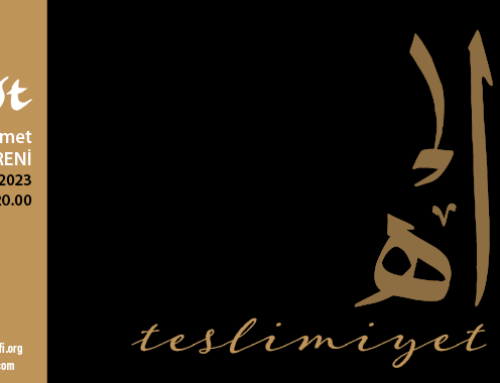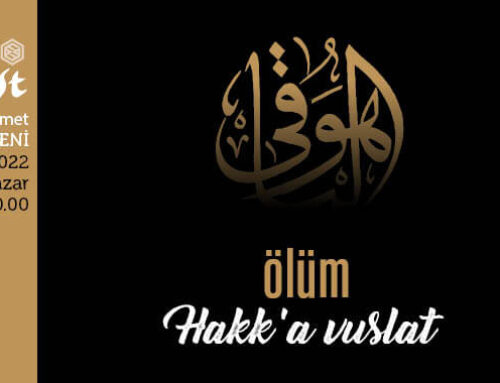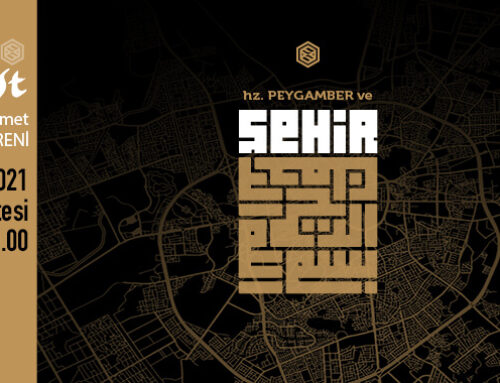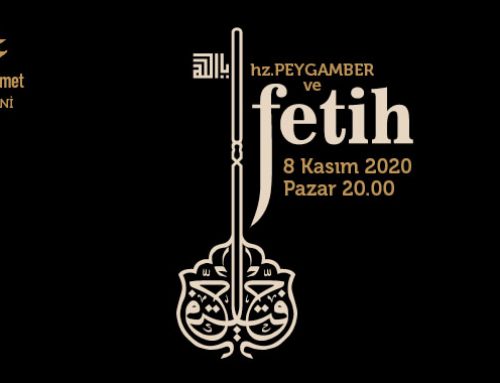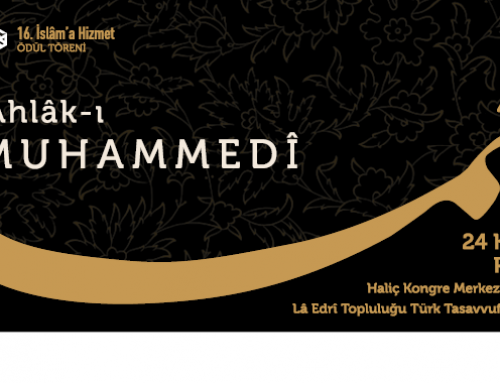Project Description
“The Prophet and Futuwwa” Title 14. DOST Awards for Service to Islam Presentation Ceremony
14th DOST Awards for Service to Islam Presentation Ceremony – LIVE
Lâ Edrî Ensemble Turkish Sufi Music Concert – LIVE STREAM
“Prophet Muhammad and Futuwwa” 14. The presentation ceremony of the DOST Service to Islam Awards will be held on December 3 in Istanbul.
The Prophet, who was sent as a mercy to the worlds. An annual event to commemorate the anniversary of the birth of Prophet Muhammad (PBUH) and his love that unites everyone under the banner of Tawhid (monotheism).
“DOST” Service to Islam Awards”
On Sunday, December 3, 2017, the ceremony will be held at the Haliç Congress Center.
“Hz. The Prophet and Fututüvvet” will be presented at a night to be organized under the title
14th “DOST” Awards for Service to Islam
Prof. Dr. Fuat Sezginfrom Turkey and Emir Abdulkadir Jazayirifrom abroad.
After the opening speeches at the award ceremony, Yavuz Uzgur, President of the Harakâni Foundation, said “Hz. The Prophet and Fututüvvet” will give a speech titled.
AWARD CEREMONY DATE: Sunday, December 3, 2017, Time: 19:00
AWARD CEREMONY LOCATION: Golden Horn Congress Center, Golden Horn Hall
Participation is free and open to all.
***14th DOST – Service to Islam Awards Presentation Night live broadcast is organized by Nefes Publishing House Inc.
Amir Abdulkâdir al-Jazâirî
Emir of Algiers Abd al-Qādir al-Jazā’īrī was born in 1807 in the village of Kaytana in Oran in western Algiers. His lineage is from the Prophet. Emir Abdulkadir’s father Muhyiddin Efendi, who was descended from our master Hasan, was a Kādiri sheikh. He received a deep-rooted education under the supervision of his father until the age of appeal and became a saint at a young age. He was also trained as a good horseman and sniper. When he was still young, he became famous for his power in religious sciences, his impressive oratory, his extensive knowledge of Islamic history, his courage, piety and virtue.
In 1825, during his pilgrimage with his father, he met Sheikh Shamil, a famous figure of his time. After completing his pilgrimage, he received the Naqshbandiyya ijazat from Mawlānā Ḥālid al-Baghdādī in Damascus and the Qādiriyya ijazat from Mahmūd al-Gaylanī in Baghdad, where he stayed for a while.
In 1830, he returned to Algeria as soon as he heard that his country was under French occupation. The tribes in the region rallied around his father, Sheikh Muhyiddîn, to confront the enemy, but he asked his son to take his place, citing his old age. In 1832, Emir Abdülkâdir, who was elected as “Amîr al-Mü’minîn”, started to fight against the French as the caliph of Sultan Abdurrahman of Morocco.
Emir Abdul Qadir said;
“We did not give ourselves permission to run the affairs of the state for ambition, pride, lust for power, or the interests of this mortal world; on the contrary – and Allah knows that this is the deepest part of my heart – we took upon ourselves the responsibility of running the state for the sake of Allah, to stop the shedding of Muslim blood by turning brother against brother, to defend the property of Muslims, and to ensure the tranquility in the country that faith and patriotism demand.”
With the Treaty of Tafna signed in 1837, he took control of a large part of the country and established a regular army with weapons brought from England.
By establishing humane regulations for prisoners of war, he earned the respect of even those who fought against him.
In his letter to King Louis Philippe, he said the following.
“Every Arab who has a Frenchman or a Christian as a prisoner is held responsible for the way he treats them. We made no distinction between prisoners and our own army in terms of food and shelter.”
When the French violated the Treaty of Tafna, he was forced to declare jihad again in 1939.
In 1840, the war spread throughout Algeria. Although Amîr Abdülkadir took refuge in Morocco with a small force, he surrendered in 1847 after the sultan’s forces were defeated by French troops. When Emir Abdul Qadir, who commanded some forty battles, surrendered, the following word came out of his lips:“Destiny!”
Despite the promise that he would be taken to Alexandria or Akkâ, he was held captive in France for five years.
When he was told by the king of France that he would be given a great gift in return for becoming one of his subjects, he replied: “If you offered me, in the name of the king, all the wealth of France and placed it on this robe of mine, I would not even think of becoming your vassal. I am your guest here. Throw me in jail if you like. But this shame will reach you, not me.”
In 1852 he was released by Napoleon III with these words.
“I wish to inform you that from now on you are free (…) in the recent past you were an enemy of France, but I give you credit for your courage, your character and your resilience under difficult circumstances. For these reasons, I have the honor to end your captivity, in full confidence in your promises.”
He then traveled to the Ottoman lands and settled in the mansion allocated to him by Sultan Abdülmecid in Bursa. After the great earthquake in 1855, he left and went to live in Damascus.
He personally intervened in the Druze rebellion that broke out in Jabal al-Lebanon and spread to Damascus, saving nearly fifteen thousand Christians from torture and death. His extraordinary efforts during this event were highly appreciated in the East and the West.
In his reply to a letter from Imam Shamil, the Sufi known as the “Hero of the Caucasus”, he said:
“What we did for Christians was a religious and humanitarian duty (…) we live in a time when few believers are truly just.
Therefore, fools think that rudeness, cruelty, injustice and intolerance are related to Islam… I hope that our Lord will give us enough patience. “
In another letter to Imam Shamil, he says: “The fact that we protect the Christian masses and provide them with security of life and property – to the extent of our means and efforts – is, as you well know, only out of our desire to fulfill what our divine faith and the responsibility of being human demands of us.”
Abdul Qadir was a brave, wise and pious administrator. He was also a good poet, a valuable intellectual. Although the number of works written by Amīr ‘Abd al-Qādir al-Jazāirī, who adopted the Akbariyya school of Sufi thought, varies according to the sources:
– “Kitab al-Mawâqif fî ba’zı işârâti al-Qur’âni ile’l-esrâr wa’l ma’ârif”,
– “Zikra’l-âqîl wa tenbîhü’l-gâfil”, (He wrote this work on philosophical and mystical issues in Bursa).
– “Al-Mikrâdu al-hâdd li-kat’ı lisâni müntekıdi dîni al-Islâm bi’l bâtılı wa’l-ilhâd”,
– “Risāla fi’l-haqāʾiki’l-gaybiyye”,
– “Nüzhetü al-hâtır fî karîzi al-Amîr Abdülkâdir” and “Ta’lîkât”. They are considered as his main works.
Amir Abd al-Qadir during his visit to the Royal Printing House:
“This morning I witnessed the tremendous firing of cannons of war; now I am in front of cannons of thought. I have seen weapons capable of destroying the walls surrounding cities; now I see machines capable of fighting kings and overthrowing states without their even knowing it!”
He died in 1883 in Damascus and was buried in the mausoleum of Ibn al-‘Arabî, whom he said was his greatest influence in Sufism. After Algeria regained its independence, his body was taken from there and transferred to the martyrs’ section of the el-Aliye Cemetery on July 5, 1966.
http://sefikcan.net/emir-abdulkadir-el-cezairi.html
Prof. Dr. Fuat Sezgin
Prof. Dr. Fuat Sezgin was born on October 24, 1924 in Bitlis. He completed primary school in Doğubeyazıt, middle and high school in Erzurum. In 1943, he came to Istanbul to study mathematical engineering. However, the German orientalist Hellmut Ritter, whose seminar he attended on recommendation, changed his whole thinking with his statement that“the foundation of sciences is based on Islamic Sciences “. As a result, he gave up studying mathematical engineering and started to study “Islamic Sciences and Orientalism” at Istanbul University, Faculty of Literature, Institute of Orientalism.
In 1947, after completing his thesis on “The Evolution of the Science of Bedī’“, he prepared his second thesis on“The Philological Influence of Abū Ubayda Me’mar Ibn al-Musannā on Majāz al-Qur’an” under the supervision of Hellmut Ritter. He prepared a critical edition of Majāz al-Qur’an .
In 1951 He graduated from the Faculty of Literature. Later,in 1954, he prepared his doctoral thesis titled “Bukhari’s Sources” in the Department of Arabic Language and Literature . With this thesis, he argues that Bukhari, which has an important place as a source of hadith, does not rely on oral sources, contrary to popular belief, that it was based on written sources.
In 1960, when the military coup government included his name in the list of 147 academics who were suspended from universities, he continued his studies at Frankfurt University. In 1965, he prepared his second doctoral thesis on “Câbir ibn Hayyân” at the Institute for the History of Natural Sciences at the University of Frankfurt, and a year later he was awarded the title of professor.
In 1967, he published the first volume of “History of Arabic Literature”, the most comprehensive work written in the field since the beginning of human history. The 17-volume work is currently in its 18th edition. the volume of Philosophy.
In 1978, Prof. Dr. Fuat Sezgin was awarded the King Faisal Prize for Islamic Sciences. With this support, he founded the“Institute for the History ofArabic-IslamicSciences” at Johann Wolfgang Goethe University in Frankfurt in 1982 and the “Museum of the History of Islamic Science” in 1983. This museum exhibits more than 800 examples of scientific instruments, tools and equipment developed by scientists who grew up in the Islamic cultural environment. This building also houses the “Library of the History of Sciences” with 45,000 volumes of books from all over the world and an archive of nearly 10,000 microfilms. This library is a specialized library that is unique in the world in terms of the History of Islamic Sciences. Founded in 2008, the “Islamic Science and Technology Museum”, which contains approximately 700 artifacts, is located in Gülhane Park.
Prof. Dr. Fuat Sezgin has a catalogue work titled “Science and Technique in Islam” in 5 volumes and 1121 pages in total, which he wrote to introduce the instruments in these museums. This is the first time such a comprehensive museum catalog has been written and published in four languages: Turkish, English, German and French.
In 2010, Prof. Dr. Fuat Sezgin founded the “Foundation for Research on the History of Islamic Science” to support the activities of the Islamic Science and Technology Museum. He pioneered the establishment of the “Prof. Dr. Fuat Sezgin Institute for the History of Islamic Science” at Fatih Sultan Mehmet Foundation University in 2013 and the “Publishing House of the Foundation for Research on the History of Islamic Science” in 2015. The income from the books published by this foundation is allocated to student scholarships.
Prof. Dr. Fuat Sezgin, who is a member of various academies at the international level, has received many awards and honors.
There is a world of knowledge, culture and civilization to which I belong, we are not rootless and unclaimed. We are the cradle of a very deep-rooted civilization. But I have seen that for centuries this civilization has been ignored, disenfranchised, insulted and persecuted, and all that it has done has been taken away from it. I aimed to introduce this dazzling accumulation of Islamic civilization and its great contributions to world science to a world that was not aware of it. Part of this endeavor is to serve the world of science, but another very important goal is to restore the lost self-respect, confidence and place in human history that the entire Islamic world has lost.
Western civilization is the child of Islamic civilization. Sciences have followed the ancient Egyptian, Babylonian, Greek, Islamic and European path. What has been put forward in the name of Western science is a continuation of Islamic science.
In general, there are those who believe that religion or a religious institution is responsible for the decline. I totally reject this. The Islamic religion has developed the sciences in a way that I have never known in any civilization. He patronized me.
This path is an arduous one, requiring endless perseverance and effort. Keeping track of which libraries or private collections have the books, tracing the researches, but especially finding a competent teacher… …One of the most important and fundamental factors in the development of the world of Islamic civilization is the fact that Muslims learn from their teachers. The teacher was the indispensable master of education.
































